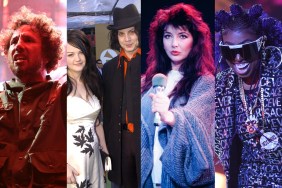Mish Barber-Way has been fronting Vancouver’s punk-rock outfit White Lung for 10 long years. So, she, guitarist Kenneth William and drummer Anne-Marie Vassilou had more than enough creative licence to change things up a little bit on their fourth album Paradise. Released in April 2016, it’s more pop than punk and more anthemic than a scream-a-long. This doesn’t make the album any less authentic, though, with Barber-Way being just as sharp-tongued as ever.
Frequently compared to the likes of Courtney Love, Barber-Way is a forced to be reckoned with. But while she does rock a shock of platinum blonde hair, red lips and a no-fucks-given attitude, she is no knock off. A lyricist, journalist, feminist writer and captivating frontwoman, her many trades bleed into one on the new record.
Watch: White Lung – Kiss Me When I Bleed
White Lung have previously been pigeonholed as a punk-rock fuelled toast to the ’90s, but the band aren’t afraid to explore new avenues on Paradise. While the three preceding albums sound like they were pulled from the pages of an angst-ridden journal, the new record sees Barber-Way get both intimate with tales of her marriage and abstract with the tales of others.
While writing and researching for VICE, Barber-Way became inspired by the stories of others and decided to channel their experiences on the album. “I was reading a lot and doing tonnes of interesting research and studies for VICE when I was working with them. So, I had so many different things and narratives of other people’s lives running through my head that were far more interesting than my own,” she explains. “The thing about fiction is that when you write it, every character that you’re writing, especially your protagonist, is usually yourself. Maybe a few key traits may be switched off. So, I kind of did that. I took stories from real people and put myself in that position and how I would be if I was them. It was just a more interesting writing process.”
These aren’t your usual sources of inspiration, though. On ‘Sister’, she sings as Karla Homolka, who with her husband Paul Bernardo, became known as the “Ken and Barbie killers” for a spree of murders in the 1980s. Meanwhile, on ‘Demented’, she recreates a fight between British-based serial killers Rosemary and Fred West.
As well as these works of reimagined non-fiction, the singer and songwriter also laid her emotions bare on love songs like ‘Kiss Me When I Bleed’. While you wouldn’t associate sappy love songs with punk rock, Barber-Way sings them with such sincerity that they work perfectly. “They say I split my pride in two. When I became a bride for you,” she croons.
It makes for easy-listening, but is it harder to write punk rock songs when you’re feeling content? “I thought it would be but it ended up producing better lyrics I think and a less misanthropic view of the world,” she says. “Even though the subjects I’m broaching are still dark in nature, they’re all about human nature. Murder, love, death. All of these very animalistic things that happen in the reptilian centre of your brain. So, I thought it would be a lot harder and that’s what I was worried about. It ended up freeing me because I wasn’t stuck writing from my own perspective. I went for something else and I think it produced better material.”
Watch: White Lung – Sister
While Barber-Way acknowledges that perfecting your lyrics and progressing as a poet isn’t very punk rock, the lyrics were a very deliberate work of art in the creation of the record.
“I’m big on lyrics. When I was a kid growing up, any band or any song I loved, I needed to know the lyrics. I wanted to read the lyrics. When I found a really great lyricist, it was so inspiring. Poetry is really hard on its own because there’s no music, whereas you can do shitty lyrics and people don’t really notice because they’re being distracted by a great melody. That’s why poetry is so hard. It’s like stand-up comedy. When it’s great, it’s great. When it’s bad, it’s awful. So the lyrics were very important to me and that’s what I spent the most time on.”
Perhaps this focus on lyrical content is why the words are carried on softer melodies rather than Barber-Way’s traditional throat-tearing screams. In an essay that the singer wrote for The Talkhouse in 2013, she spoke about the empowering nature of screaming. She explained this was especially true of women in rock and roll, though there was usually a pattern in which female punk singers eventually traded their banshee-style screams for more melodic whispers once they hit mainstream success. Kind of like how Courtney Love went from ‘Teenage Whore’ to ‘Malibu’. The same could now be said for Paradise, which has a noticeable absence of Barber-Way’s usual growls. So what changed her mind?
“Well, it’s two things. One is your physiology. It’s hard to scream every night for weeks of a tour. It doesn’t matter how many vocal exercises you do or how little you speak in the day or whatever strategy you use, your voice is a muscle and muscles get tired. I proved that I can scream over and over again. I proved it all through the albums. Now I wanted to prove that I could do something else.”
Barber-Way does recognise that the softer side might not be for everyone. But naturally, she doesn’t give a fuck. “We came from hardcore, we came from punk. I’ve done all that. There’s not much more to do, we’ve got to do something else,” she says sounding a little exasperated. “So what could we do? Make it a bigger rock album, put a little pop in there. It’s like, if Taylor Swift decided to make a hardcore album tomorrow, I’d be like ‘yeah, that makes sense. She started off in a little country ditty and now she’s pop and now she’s trying something new.’ It would probably suck but you get to that point where you’ve mastered something or you feel like you’ve done all you can do in that genre or in that particular way. It’s a challenging thing for a band. How do we remain us and try something new that doesn’t alienate our fans?”
But to fans who complain that they miss the old sound? Mish says to suck it up. “That also gets so boring!” she says in a voice that you can tell comes with a big eye roll even over the phone. “It’s like, the other records exist. They don’t evaporate into thin air when we write a new one! So for anyone who doesn’t like the new stuff, the old stuff is still there…Not everyone is going to like everything too and there’s nothing wrong with that. You can’t make everyone in the world jump on your train. It’s just not real.”
A lot of fans seem to be lapping up the new White Lung, though. ‘Below’, one of the more mellow and Hole-sounding tracks on the album, is proving to be a crowd favourite despite its demure qualities. A song about the rigged standards of female beauty, it’s no wonder it has become a bit of an anthem. “The most surprising thing for me is that when we play ‘Below’ that’s really when people start moshing, which I think is super weird! People get really into it. It’s when they really start to bob and dance. They go crazy for other stuff but that’s the song that really gets people jumping. It’s strange but that’s what music is there for!”
Watch: White Lung – Below
The new album isn’t just acclaimed by fans, with Rolling Stone and NME both featuring White Lung’s latest record on their respective album of the year lists. “It’s always nice to be recognised that way,” she says proudly. “This record was done at the end of 2015. So, it’s like when you publish a book and you wait a year or six months for the thing to actually be released to the public. By this point you’ve already digested and done all you can with it and it’s just like ‘ugh, ok take it!’. You’ve done your toiling and your work and your tedious changes. But then, with music, you get revitalised when you go and play the record for a whole year live and that’s a whole new battle.”
White Lung are about to take that challenge down under with their spot on February’s St Jerome’s Laneway festival. Plus, mega fans can get their extra fix with the string of sideshows around the country. When discussing whether they prefer club shows or festivals, Barber-Way uses sweeping metaphors to compare the two.
“Well, I like a healthy mix to be honest. Nothing beats a good club show when it’s fully packed and sweaty and crazy and everyone’s going nuts. But, this is the comparison: The club show is like eating at a diner where you know it’s always good and it’s maybe not so good for you, but you’re going to have that exact drink you want and that greasy burger and it’s going to be satisfying and perfect,” she explains.
“But when you’re eating your vegetables, you’re spending a little more money and you’re taking care of yourself in a different way and there are all of these people seeing you in a different way. I mean, you’re still treated well in a club but it’s not to the same shuffle or calibre of a festival. They’re just very different. That’s like eating at some fine dining place where you’re enjoying your little appetisers and then you move on. Plus, at festivals you know there are probably some people there who have never seen you before. At a club show you know everyone there is your fan. You’re headlining and people paid to see you. At a festival, it’s a sample platter where you kind of just walk around and see what’s going on and you have to get people interested.”
Regardless of whether you’re going for the fast food or fat-free option, you can expect a raucous show from the Vancouver visionaries. Barber-Way is known for her aggressively captivating performances and it’s not hard to tell that she feels at home on the stage.
“Sometimes I’m really excited to go on stage and other nights it’s the last thing you want to do. But once the music starts and we’re a couple of songs in, I usually forget what I’m mad about. I have a very anxious brain. I am constantly thinking and that voice in my head never stops. There’s only two times when it really shuts off: when I’m performing and when I’m having sex. It’s my version of meditation.”
–
‘Paradise’ is out now and you can catch Mish and White Lung in their element at Laneway Festival and their headline sideshows in February 2017.












